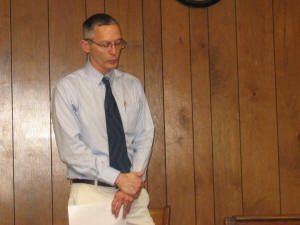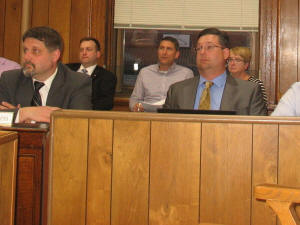|
Logan County Board approves
Decommissioning Plans and Agreements for both the Sugar Creek and
Whitney Hill Wind Farm
 Send a link to a friend
Send a link to a friend
 [May 01, 2019] [May 01, 2019]
On Tuesday, April 16, the Logan County Board voted on
Decommissioning Plans and Decommissioning Agreements for both the
Sugar Creek and Whitney Hill Wind Farm projects.
Patrick Engineering was the third-party consultant that recommended
the approval for both plans.
Members present were Board Chairman Emily Davenport, Vice chairman
Scott Schaffenacker, Kevin Bateman, Dave Blankenship, Janet Estill,
Bob Farmer, David Hepler, Steve Jenness, Chuck Ruben, Bob Sanders,
Annette Welch and Jim Wessbecher.
At the prior Board Workshop held on Thursday there were some
questions and discussion about the Decommissioning Plan for the
Sugar Creek Wind Farm project.
Board member Kevin Bateman said in the Planning and Zoning Committee
meeting the number of turbines was brought up. The Decommissioning
Plan for Sugar Creek Wind Farm only covers the resale for twelve
turbines and Bateman thinks it should cover all 57.

Patrick Engineeringís Matt Minder said it is assumed that the resale
of just twelve turbines would bring a higher salvage value, as
opposed to just scrapping them through the process of scrap.
Overall, there was agreement that although the resale market is kind
of fledgling at this time, it is a reasonable assumption some could
be sold.

Project attorney Kyle Barry said he feels like there is an
assumption that some turbines might be resold, and some would be
sold for scrap.
The value of financial security, which is the bond or the letter of
credit, is not based on whether a turbine is sold or scrapped.
Instead, the amount is based on the total projected cost of
decommissioning, which is $9.6 million.
Barry said the recommendation from Patrick Engineering is that the
project posts at least 10 percent of that cost. The way turbines are
dealt with in the end does not change that amount and the financial
security will be there regardless.
Barry said the Agricultural Impact Mitigation Agreement strongly
suggests the county re-evaluate the bond in 10 years, and if the
salvage value or price of resale has dropped, the amount could be
adjusted then.
Planning and Zoning Committee Chairman David Hepler said the county
has used Patrick Engineering before and they are the experts who
know the industry and the standards, so we should just follow
whatever they recommend.
Bateman said we cannot see into the future, but he would rather all
the turbines be covered since there is no guarantee that the
turbines will be sellable in 10 years.
Board member Annette Welch asked whether the plan decommissions all
the turbines, but the value assessed at 10 percent of the cost is
the only factor on whether or not they are resold.
Barry asked, do you assume that all are going to be resold because
there is a resale market for turbines, or do you assume all of them
are sold for scrap value? What the equipment is worth depends on
whether it is sold as an intact turbine or for scrap value. Turbines
are worth more if they are resold, but Barry said for financial
security, these calculations do not matter because the projected
cost for decommissioning would still be the same.
Ruben said in that case, it would not matter much if the plan was
changed to cover resale of all the turbines.
Barry said it could affect the estimate on what they could sell.
Patrick Engineering has made a conservative estimate on the value of
the equipment based on resale vs. scrap value.

Minder said if you just look at all the turbines as scrap, that
would be a lower value, but the financial assurance is based on
overall value of decommissioning.
Minder said the Department of Agricultural demands that financial
assurances increase by 50 percent after five or six years and by 100
percent after 10 years.
The Agricultural Impact Mitigation Agreement allows the salvage
scrap value to be offset by the overall decommissioning cost, but
the county needs to ďsubordinateĒ the amount and realize the entire
value. The owner is required to cover the remainder of the cost.
Bateman said the owners would be ahead if they are able to sell the
turbines. He wants to cover the citizens and make sure the money is
there for scrap if the bottom falls out of the market.
Ruben said he thought bonding would not increase as much because of
the higher salvage value. He asked who would be on the hook for the
difference in costs if the value changes and the bond does not cover
the entire cost at 10 years.
Barry said the bond is based on whatever the cost of decommissioning
is, and it may change in 10 years if it is reevaluated and 50
percent is posted instead of the 10 percent posted initially. The
board can require the company to post more. The difference would
have to be paid by the company if the bond is not sufficient.
Minder said the bond would cover so much of it, and the county could
take out a lien to cover the salvage value, but the company is
required to cover the difference.
Board Vice chairman Scott Schaffenacker asked who the lien would be
against. Ruben said the LLC.
Bateman wanted the bond to be significant enough to decommission all
the turbines if there is a case where none of them are sellable.
Welch said it sounds like the board needs to do due diligence by
having everything reassessed and asking for more financial assurance
in a few years.
[to top of second column] |

Minder said the $9.6 million is exclusive of any sale, but is the
total cost to take everything down and dispose of it.
Bateman said the wording should be changed to say that.
Ruben said he wanted more explanation on whether the bond would
change down the road, and what would and would not change, before he
would vote.
Schaffenacker asked Minder if he approached each decommissioning
plan differently.
Logan County Zoning Officer Will DíAndrea said similar language is
in each of the decommissioning plans and agreements. Minder said the
review is similar, but they look at each one individually.

When it came time to vote at the board's Regular session on Tuesday,
April 16th, Hepler brought forward motions to approve the
Decommissioning Plan for Sugar Creek Wind Farm and to approve the
Decommissioning Agreement for Sugar Creek Wind Farm.
Before the board voted, Minder again addressed some of the concerns
about financial assurance brought up the prior Thursday. Minder said
the Agricultural Impact Mitigation Agreement provides reasonable
bonding and it increases through the years:
From years one through five, the bond is10 percent of the projectís
decommissioning costs, in years six through 10, the bond increases
to 50 percent, and by year 11, the bond would be fully funded at 100
percent. In the first 10 years, the county recoups the cost.
Bateman asked whether they were going to change the wording on the
Sugar Creek Decommissioning Plan on the number of turbines, and
again said he would vote 'no' if wording was not changed since there
is no guarantee any turbines are sellable.
Bateman wanted the taxpayer expense to be covered, and said he felt
it prudent to recommend the county board cover all the turbines if
something goes sideways.

Yuri Otarov on the
right
Batemanís question was answered by Yuri Otarov, an Engineer for
Algonquin Power, the parent company of project developer Liberty
Power.
Otarov said where the company stands right now, they have a $180 M
in contracts signed for the turbines, and to say brand new machines
are going to be considered salvage value for scrap metal is not
entirely correct.

To help make his point, Otarov said if you buy a brand-new car, in
years one through five, you would not salvage the car for scrap, but
would try to resell. The assumption made by the company is that 30
percent of the brand-new machines will be resold, which Otarov said
is standard practice, though some other projects have gone as high
as setting up 90 percent for resale.
Hepler said the county needs to rely on the expertís opinions and
not a crystal ball. He commented that the only other person who
works for the county that is qualified to question the agreements is
the county engineer, and if County Engineer Bret Aukamp was
expressing similar concerns, Hepler said he would probably defer to
what Aukamp said.
Board member Bob Sanders said he wanted to figure on the worst-case
scenario and feels the best interest of the county would be to
include all turbines.
Board member Scott Schaffenacker reminded the board that the letter
of credit for financial assurance is based on the whole
decommissioning plan and the numbers make sense.
Ruben said it would change the letter of credit because the number
of turbines would change the decommissioning costs.
Barry said the increase in decommissioning costs could be due to
costs of cutting turbines in pieces for scrap and hauling them off
rather than selling them.
Ruben said the salvage value for turbines is a lot less than the
resale value, and when you figure the costs to tear them down,
everything remains [as a] statistic. There would just be fewer
dollars to put against it when the turbines are figured in as
salvage rather than being sold, so it would change decommissioning
costs. Ruben said that is simple math.
The motions for both the Decommissioning Plan and the
Decommissioning Agreement for Sugar Creek Wind Farm passed 7-5.
Farmer, Hepler, Jenness, Ruben, Schaffenacker, Welch and Wessbecher
voted yes.
Bateman, Blankenship, Davenport, Estill and Sanders voted no.

Hepler then brought forward two motions for the Whitney Hill Wind
Farm with recommendations from Patrick Engineering. One motion was
to approve the Decommissioning Plan and the other was to approve the
Decommissioning Agreement for Whitney Hill.
Ruben amended the motion for the Whitney Hill Decommissioning Plan
to take all the turbines to salvage value.
Daniel Sheehan of Swift Current Energy said he had looked at the
numbers and nominal increase in the dollar amount and felt it was a
reasonable request to accommodate given the smaller size of the
project.
Rubenís amendment passed unanimously.
The main motion to approve the Decommissioning Plan for Whitney Hill
passed 11-1 with Sanders voting no.
The Decommissioning Agreement for Whitney Hill also passed
unanimously.
[Angela Reiners]
|